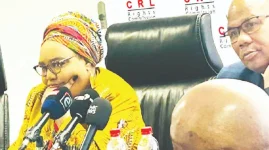South African religious groups face serious problems with no proper oversight, according to the CRL Rights Commission. The commission released a report showing widespread abuse across religious organizations after holding investigative hearings from 2015 to 2017. They examined how religion became commercialized and belief systems exploited.
CRL chairperson Thoko Mkhwanazi-Xaluva pointed to the Omotoso case as a clear example of these issues. She explained that anyone can start a church or religious group without restrictions. People have nowhere to report problems when they occur. The commission highlighted Angel Ministry in Eastern Cape as an extremist church claiming divine powers. This church reportedly teaches that education is wrong because Satan controls schools.
The 60-page document reveals that many religious organizations ignore existing laws. Numerous churches fail to register with the social development department as required and skip submitting mandatory annual reports. Mkhwanazi-Xaluva noted that these organizations operate without codes of conduct, essentially functioning as businesses without accountability.
The commission plans to address these findings through a press conference. They will introduce a peer review system to strengthen regulation throughout the religious sector. This proposed oversight mechanism aims to create structured ethical compliance standards for religious groups and establish clear channels for reporting misconduct.
CRL chairperson Thoko Mkhwanazi-Xaluva pointed to the Omotoso case as a clear example of these issues. She explained that anyone can start a church or religious group without restrictions. People have nowhere to report problems when they occur. The commission highlighted Angel Ministry in Eastern Cape as an extremist church claiming divine powers. This church reportedly teaches that education is wrong because Satan controls schools.
The 60-page document reveals that many religious organizations ignore existing laws. Numerous churches fail to register with the social development department as required and skip submitting mandatory annual reports. Mkhwanazi-Xaluva noted that these organizations operate without codes of conduct, essentially functioning as businesses without accountability.
The commission plans to address these findings through a press conference. They will introduce a peer review system to strengthen regulation throughout the religious sector. This proposed oversight mechanism aims to create structured ethical compliance standards for religious groups and establish clear channels for reporting misconduct.












